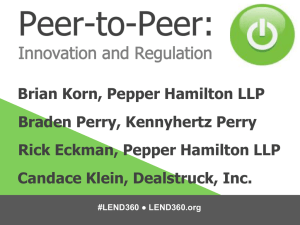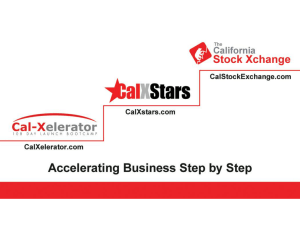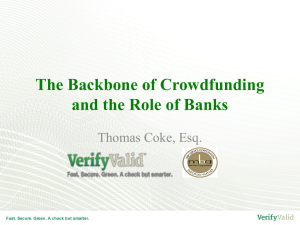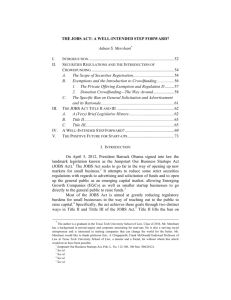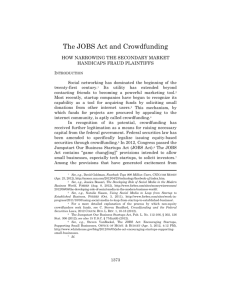as PDF - Emory University School of Law
advertisement
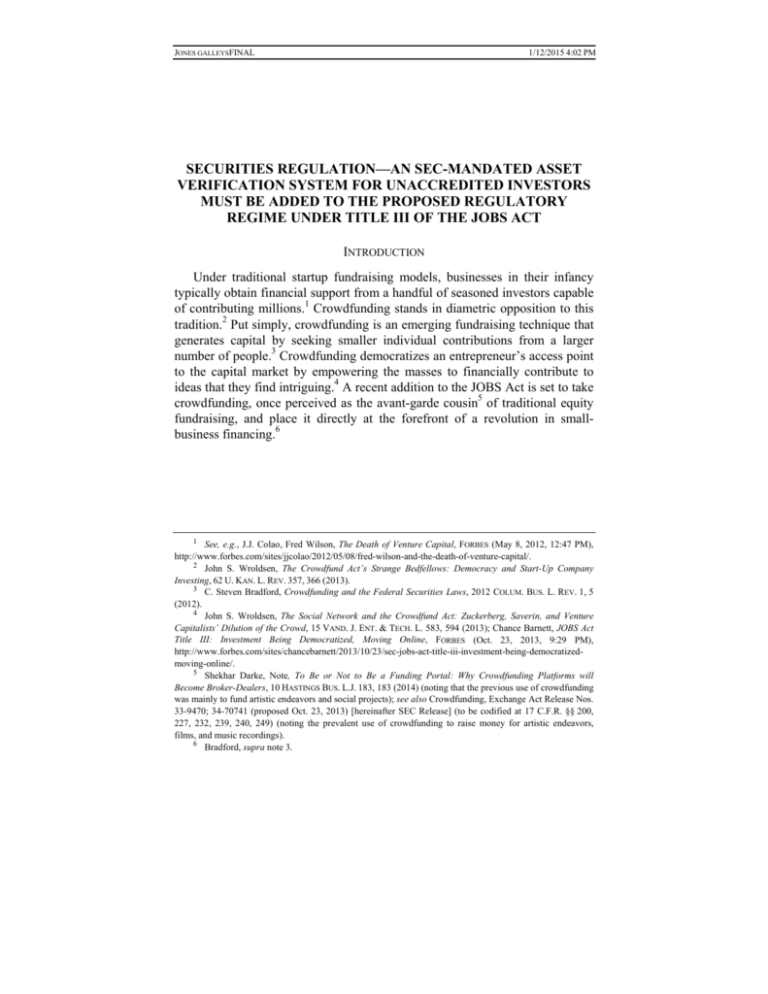
JONES GALLEYSFINAL 1/12/2015 4:02 PM SECURITIES REGULATION—AN SEC-MANDATED ASSET VERIFICATION SYSTEM FOR UNACCREDITED INVESTORS MUST BE ADDED TO THE PROPOSED REGULATORY REGIME UNDER TITLE III OF THE JOBS ACT INTRODUCTION Under traditional startup fundraising models, businesses in their infancy typically obtain financial support from a handful of seasoned investors capable of contributing millions.1 Crowdfunding stands in diametric opposition to this tradition.2 Put simply, crowdfunding is an emerging fundraising technique that generates capital by seeking smaller individual contributions from a larger number of people.3 Crowdfunding democratizes an entrepreneur’s access point to the capital market by empowering the masses to financially contribute to ideas that they find intriguing.4 A recent addition to the JOBS Act is set to take crowdfunding, once perceived as the avant-garde cousin5 of traditional equity fundraising, and place it directly at the forefront of a revolution in smallbusiness financing.6 1 See, e.g., J.J. Colao, Fred Wilson, The Death of Venture Capital, FORBES (May 8, 2012, 12:47 PM), http://www.forbes.com/sites/jjcolao/2012/05/08/fred-wilson-and-the-death-of-venture-capital/. 2 John S. Wroldsen, The Crowdfund Act’s Strange Bedfellows: Democracy and Start-Up Company Investing, 62 U. KAN. L. REV. 357, 366 (2013). 3 C. Steven Bradford, Crowdfunding and the Federal Securities Laws, 2012 COLUM. BUS. L. REV. 1, 5 (2012). 4 John S. Wroldsen, The Social Network and the Crowdfund Act: Zuckerberg, Saverin, and Venture Capitalists’ Dilution of the Crowd, 15 VAND. J. ENT. & TECH. L. 583, 594 (2013); Chance Barnett, JOBS Act Title III: Investment Being Democratized, Moving Online, FORBES (Oct. 23, 2013, 9:29 PM), http://www.forbes.com/sites/chancebarnett/2013/10/23/sec-jobs-act-title-iii-investment-being-democratizedmoving-online/. 5 Shekhar Darke, Note, To Be or Not to Be a Funding Portal: Why Crowdfunding Platforms will Become Broker-Dealers, 10 HASTINGS BUS. L.J. 183, 183 (2014) (noting that the previous use of crowdfunding was mainly to fund artistic endeavors and social projects); see also Crowdfunding, Exchange Act Release Nos. 33-9470; 34-70741 (proposed Oct. 23, 2013) [hereinafter SEC Release] (to be codified at 17 C.F.R. §§ 200, 227, 232, 239, 240, 249) (noting the prevalent use of crowdfunding to raise money for artistic endeavors, films, and music recordings). 6 Bradford, supra note 3. JONES GALLEYSFINAL 48 1/12/2015 4:02 PM EMORY CORPORATE GOVERNANCE AND ACCOUNTABILITY REVIEW [Vol. 1 On October 23, 2013, the crowdfunding landscape changed dramatically.7 After more than fifteen months of delays, the Securities and Exchange Commission issued its formal proposal of Title III to the JOBS Act.8 Once enacted, Title III will lift the ban on general solicitation for securities purchases, allowing emerging growth companies9 to advertise their fundraising endeavors and engage in equity crowdfunding in an open market for the first time in more than eighty years.10 The ban was to be lifted in two parts, first with Title II, and second with Title III. Title II of the JOBS Act allowed emerging growth companies to advertise and solicit investments from accredited investors.11 The SEC strictly regulates which entities can call themselves an “accredited investor,” and reserves the category only for institutions such as banks, insurance companies and registered investment companies, as well as individuals with a net worth of more than $1 million, or an annual income above $200,000.00.12 Once fully implemented, Title III of the JOBS Act will open the market further by allowing general solicitation of investments from the public at large. Anyone with access to a computer will now also have access to registered funding portals where they can request and receive capital.13 The most optimistic proponents of Title III estimate that it will unleash a new wave of capital into the U.S. investing market to the tune of $300 billion.14 I. REGULATIONS TO PREVENT FRAUD ON THE MARKET There is a well-established body of scholarship that has voiced concerns over protecting unsophisticated investors from potential fraud in equity 7 Michael S. Piwowar, Comm’r, Sec. & Exch. Comm’n, Statement at Open Meeting Regarding Crowdfunding (Oct. 23, 2013) available at http://www.sec.gov/News/Speech/Detail/Speech/1370539996703#.UoMwN7QTtO0. 8 Barnett, supra note 4. 9 H.R. Res. 3606, 112th Cong. § 101(d) (2012) (creating a statutory definition for “emerging growth company”). 10 Patrick Clark, Selling Shares Through Crowdfunding Inches Closer to Reality, BLOOMBERG BUSINESSWEEK (Oct. 23, 2013), http://www.businessweek.com/articles/2013-10-23/selling-shares-throughcrowdfunding-inches-closer-to-reality. 11 Barnett, supra note 4. 12 Kristen McNamara, Definition of “Sophisticated Investor” Varies, MARKET WATCH (Apr. 26, 2010, 7:40 AM) http://www.marketwatch.com/story/definition-of-sophisticated-investor-varies-2010-04-26. 13 See Barnett, supra note 4. 14 Id. JONES GALLEYSFINAL 2014] 1/12/2015 4:02 PM SECURITIES REGULATION 49 crowdfunding.15 The Securities and Exchange Commission no doubt shares these concerns, as the vast majority of the 568-page proposed Title III regulation deals with reporting and disclosure requirements aimed at minimizing the prevalence of fraud on the market.16 One key regulatory proposal to Title III of the JOBS Act addresses control over how much each unaccredited investor may invest in a twelve-month window. These investment caps are rooted in a bifurcated system based on net worth.17 An individual with a net worth of less than $100,000.00 may not contribute more than the greater of $2,000.00 or five percent of annual income.18 Individuals with a net worth greater than $100,000.00 may contribute 10% of their annual income so long as the total contribution does not exceed $100,000.00 in a twelve-month period.19 II. THE PROPOSED REGULATION’S DEFICIENCY As currently written, the income-cap regulations for potential investors lack teeth. Nowhere in the regulation is there a provision that requires crowdfunding platforms to verify the income or assets of unaccredited investors. The system is based entirely on unchecked self-reporting by unsophisticated investors.20 There is nothing that prevents an investor from lying about their assets, or making common mistakes in their calculation, such as including the value of their home in their net worth.21 This creates a troublesome scenario for the future of crowdfunding. The current scholarly discussion seems to be exclusively focused on protecting the unaccredited investors from the emerging growth company. This one-sided focus begs the question: should the Securities and Exchange Commission also be concerned about protecting unaccredited investors from themselves? 15 See generally Thomas Lee Hazen, Crowdfunding or Fraudfunding? Social Networks and the Securities Laws—Why the Specially Tailored Exemption Must Be Conditioned on Meaningful Disclosure, 90 N.C.L. REV. 1735, 1744 (2012); Wroldsen, supra note 4, at 594 ; David Mashburn, Comment, The Anti-Crowd Pleaser: Fixing the Crowdfund Act’s Hidden Risk and Inadequate Remedies, 63 EMORY L.J. 127, 134 (2013). 16 See SEC Release at 10. 17 Id. 18 Id. 19 Id. 20 Id. 21 Kathleen Pender, SEC Issues Long-Awaited Equity Crowdfunding Rules, SF GATE (Oct. 23, 2013, 3:41 PM) http://blog.sfgate.com/pender/2013/10/23/sec-issues-long-awaited-equity-crowdfunding-rules/. JONES GALLEYSFINAL 50 1/12/2015 4:02 PM EMORY CORPORATE GOVERNANCE AND ACCOUNTABILITY REVIEW [Vol. 1 III. THE NEED FOR SEC-MANDATED ASSET VERIFICATION FOR UNACCREDITED INVESTORS By failing to create an asset verification process for unaccredited investors, the Securities and Exchange Commission has created a strange dichotomy in its regulatory regime. When the first wave of solicitation restrictions was lifted under Title II of the JOBS Act, the SEC raised the level of diligence for companies when verifying the status of purchasers as accredited investors.22 Accompanying Title II of the JOBS Act was a newly-amended Rule 506(c), which requires companies to verify the assets of an accredited investor.23 The new rule states that, “the issuer shall take reasonable steps to verify that purchasers of securities sold in any offering under paragraph (c) of this section are accredited investors.”24 The Securities and Exchange Commission even goes as far as to provide a list of suggested methods to perform this verification.25 To verify assets, the SEC suggests verifying bank statements, brokerage statements, statements of other securities holdings, certificates of deposit, tax assessments, and appraisal reports issued by independent third parties.26 For liabilities, the commission suggests reviewing a consumer report from at least one of the nationwide consumer reporting agencies.27 If the Securities and Exchange Commission would stiffen the equity crowdfunding company’s requirement to verify the assets and liabilities of accredited investors, who, according to the commission’s own definition, have enough knowledge and experience in business matters to evaluate the risks and merits of an investment,28 why would they not do the same for unsophisticated investors? Drafting a rule that restricts the ability of an investor with less than $100,000.00 in net worth to participate in equity crowdfunding is unavailing if not accompanied by subsequent verification of their net worth. If no one is there to correct an investor’s false or mistaken claim that his or her net worth is 22 Legal Insight by Gary J. Kocher, Reasonable Steps to Verify Third Party Certification Procedure Designed to Comply with New SEC Rules Permitting General Solicitation in Reg D Private Offerings, K&L GATES, (Oct. 9, 2013) http://www.klgates.com/files/Publication/6c31add1-8cfb-4667-ba2c0ef7583ca48b/Presentation/PublicationAttachment/e9477896-668a-4e4d-822e11e6f5c8399f/Client_Alert_10092013.pdf. 23 17 C.F.R. § 230.506 (2012). 24 Id. 25 Id. 26 Id. 27 Id. 28 McNamara, supra note 12. JONES GALLEYSFINAL 2014] 1/12/2015 4:02 PM SECURITIES REGULATION 51 greater than $100,000.00, the regulation is self-defeating. The absence of an asset verification provision in the Title III regulation creates a perfect storm of factors which will allow everyday consumers to overextend their finances on junk-investments.29 Flashy marketing and creative sales pitches could quite easily lure “grandma” away from her Facebook page and into a platform where she can “bet the farm” on a startup company that has between a 50%-75% chance of failing within five years.30 Because there is no marketplace incentive for the verification of unaccredited investors assets, the regulation must come from the Securities and Exchange Commission. The crowdfunding process relies almost exclusively on third-party intermediaries such as Indiegogo and Kickstarter. The vast majority of these intermediaries make their money by charging a commission fee, which can range anywhere from 2.9% to 9% of the total funds raised.31 The incentive for these websites is to serve their clients by raising as much money from as many people as possible, regardless of whether the investors can afford their contributions. The companies themselves also have a natural incentive to raise as much capital as possible. The requirement to verify unaccredited investor income must be codified by the Securities and Exchange Commissions, or else it simply will not happen. There is no need to speculate on the problems that can arise from allowing consumers to make major investments without verifying their assets. All the Securities and Exchange Commission needs to do is look back to the home mortgage crisis. In the period before the market crash, banks made it a routine practice to give loans to high-risk borrowers.32 Many only ever asked the borrower to state his or her annual income without presenting any documentation.33 The consequences were disastrous for both the mortgagebacked securities market, and the economy at large. A forensic reconstruction of the market crash reveals that the collapse was fueled by greed on both sides 29 Mashburn, supra note 15, at 13‒16. See SEC Release, supra note 11, at 157 n. 393 (citing a study by the U.S. Small Business Administration which states half of all new businesses fail within five years, and a study by Wall Street Journal finding that out of nearly 2,000 companies that received at least $1 million in venture funding, almost three-quarters of these companies failed). 31 See Alvaris Falcon, 10 Crowdfunding Sites To Fuel Your Dream Project, HONGKIAT, http://www.hongkiat.com/blog/crowdfunding-sites/ (last visited Jan. 11, 2014). 32 Steven Pearlstein, ‘No Money Down’ Falls Flat, WASHINGTON POST (Mar. 14, 2007), http://www.washingtonpost.com/wp-dyn/content/article/2007/03/13/AR2007031301733.html. 33 Id. 30 JONES GALLEYSFINAL 52 1/12/2015 4:02 PM EMORY CORPORATE GOVERNANCE AND ACCOUNTABILITY REVIEW [Vol. 1 of the table.34 Where assets and income went unchecked, millions of borrowers chased their dream home by entering into mortgage contracts they simply could not afford.35 Lenders were all too eager to make and securitize those loans.36 This greed is the link between the home mortgage crisis and the deficiency in the newly announced regulations to Title III. When the Securities and Exchange Commission officially opens the door for the common man to participate in equity crowdfunding, that same two-way street of greed will be present in the market for capital.37 Thirsty startup companies will be eager to drink as much as they can from the crowdfunding fountain.38 Unaccredited investors, unwitting as they might be, will be eager to invest their money through crowdfunding platforms in hopes that they may win the startup lottery.39 The Securities and Exchange Commission must implement some sort of process to verify the assets of unaccredited investors so that these individuals do not financially overextend themselves on startup businesses, the majority of which will fail.40 HARRISON JONES∗ 34 See Eli Lehrer & George Benston, Subprime Borrowers: Not Innocents, BLOOMBERG BUSINESSWEEK, http://businessweek.com/debateroom/archives/2008/03/subprime_borro wers_not_innocents.html (last visited Jan. 11, 2014); Ryan Barnes, The Fuel That Fed the Subprime Meltdown, INVESTOPEDIA (Feb. 26, 2009) http://www.investopedia.com/articles/07/subprime-overview.asp. 35 Lehrer, supra note 34. 36 See Pearlstein, supra note 32. 37 William T. Smith, Risk, The Spirit of Capitalism and Growth: The Implications of a Preference for Capital, 21 J. MACROECON. 241, 241 (1999) (stating that the desire for accumulation of wealth is at the core of the spirit of capitalism, and is thought to be the driving force behind economic growth). 38 See Wroldsen, supra note 2, at 366. 39 Id. at 585‒86 (stating that nearly three thousand investors have already pledged to donate $7.5 million when equity crowdfunding becomes fully legal). 40 Pender, supra note 21. ∗ Emory University School of Law, J.D. Candidate, 2015; Executive Managing Editor, Emory Corporate Governance and Accountability Review; Competitor, Philip C. Jessup International Law Moot Court Competition; President, Emory Real Estate Law Society; B.A. Political Science, University of South Florida. I would like to thank Anthony Thompson for sharing his business acumen during the inception of this piece and Ted Canter for helping me craft and refine my work throughout its many drafts. I would also like to thank my parents for their unwavering and selfless support.




